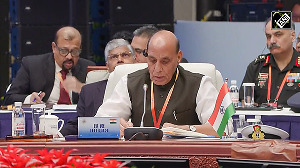Pakistan's Supreme Court has struck down President Asif Ali Zardari's order appointing two top judges, stoking fears of a fresh showdown between the government and judiciary with the ruling Pakistan People's Party blaming the fiercely independent Chief Justice for the crisis.
Going against the recommendations of the country's top judge Iftikhar Chaudhry, the President on Saturday appointed Lahore High Court Chief Justice Khwaja Muhammad Sharif as a judge of the apex court.
Zardari also named Saqib Nisar as Acting Chief Justice of Lahore High Court. However, within hours, Nisar defied his order and said he would not take oath as acting chief justice.
A special bench of the apex court took suo motu notice of the President's orders and suspended them during an emergency hearing on Saturday evening.
As reports of an impending government-judiciary showdown did the rounds, rumours swirled here that Zardari, also the chief of ruling PPP, could resort to extraordinary steps, including imposition of emergency, to assert his authority.
Reacting to rumours, presidential spokesman Farhatullah Babar told media persons that emergency was not being imposed. TV news channels quoted sources in the presidency as saying that all decisions would be made by the government in accordance with the law and the Constitution.
Soon after the presidency issued the two notifications for judicial appointments, Chaudhry, who was in Karachi, took suo motu notice of the matter and constituted a special bench to hear it on an urgent basis.
The three-judge special bench heard the case on Saturday evening and suspended the notifications issued by the President, saying they violated Article 177 of the Constitution, which states that all members of the superior judiciary will be appointed by the President after consulting the Chief Justice.
The special bench said the current Chief Justice of the Lahore High Court would continue to work in his position. It then adjourned the matter till February 18.
However, presidential spokesman Babar claimed the Chief Justice was consulted before the appointments were announced. Even before the special bench gave its verdict, Justice Nisar refused to take oath as the acting Chief Justice of the Lahore High Court.
'I will not take oath as acting Chief Justice of the high court... I will do what Chief Justice Iftikhar Chaudhry asks me to,' Nisar told BBC Urdu.
The President's orders conflicted with recommendations of the Chief Justice, who wanted Justice Nisar be made a judge of the apex court, reports said.
Zardari's decision came after the apex court constituted a five-member bench to hear a case related to delays in the appointments of judges.
Several PPP leaders held Chaudhry responsible for the current crisis, with President of its Punjab chapter Rana Aftab Ahmed saying "the heavens would not have fallen if the chief justice had waited till Monday to take up the matter.
"Perhaps, this is the first example in the country's history of the Supreme Court holding a session in the evening to suspend a presidential order," he said, adding if the chief justice wanted to appoint judges on his own, he should not have sent his recommendations to the President.
"This is against the spirit of the independent judiciary. The chief justice should respect the mandate of the people. If he does not want to allow the democratic system to run, then it is better for him to assume the offices of the President and the prime minister," Ahmed said.
He contended that the Supreme Court's decision to suspend the President's orders was a move to destabilise the country. "Please stop playing with the nation and do not take steps which could lead to the disintegration of Pakistan."
Mian Ijazul Hasan, another senior PPP leader, said: "The chief justice has become a party against the PPP-led government and is acting like the head of a police station."
He said it was unfortunate that the judiciary is "derailing" democracy instead of strengthening it. "The actions of the Chief Justice must look impartial," Hasan said.
On the other hand, main opposition PML-N spokesman Ahsan Iqbal blamed the government for the crisis, describing the President's order as an attempt to create a divide in judiciary. "It is unfortunate for democracy. The PML-N supports the judiciary. However, it will not allow any element to wrap up the democratic process," he said.
The government and judiciary have often not seen eye-to-eye since Zardari took office in 2008 and dilly-dallied on an election pledge to reinstate Chaudhry after his sacking in 2007 by then military ruler Pervez Musharraf. Zardari restored Chaudhry in March last year after nationwide protest by PML-N.
On December 16 last year, the Supreme Court abolished the controversial Musharraf-era National Reconciliation Ordinance, which gave amnesty in graft cases to Zardari and 8,000 others.
Zardari and Chaudhry were again on a collision course now following Saturday's developments.





